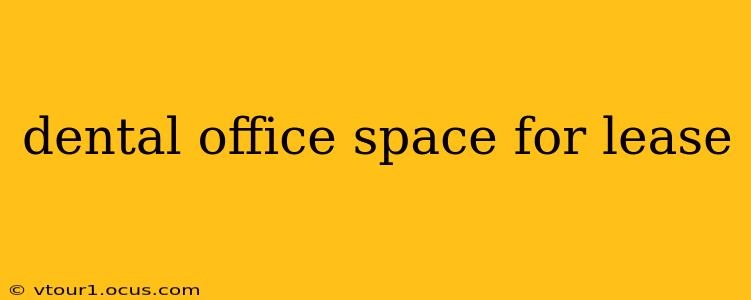The search for the ideal dental office space for lease can feel overwhelming. Finding the right location, size, and amenities requires careful planning and research. This guide will walk you through the essential steps, answering common questions and offering valuable insights to help you make an informed decision.
What are the key factors to consider when leasing dental office space?
This is a crucial question, as many factors influence the success of your dental practice. Key considerations include:
- Location: Patient demographics, accessibility (parking, public transportation), visibility, and proximity to competitors are all paramount. A location with high foot traffic or near other medical facilities can be highly advantageous. Consider the community's socioeconomic profile and its alignment with your target patient base.
- Size: The square footage needed depends on the scope of your practice and the number of operatories you plan to have. Allow for ample space for reception, waiting areas, sterilization, storage, and staff areas. Future expansion should also be factored in.
- Layout: An efficient layout is essential for smooth workflow and optimal patient experience. Consider the placement of operatories, sterilization areas, and waiting rooms for efficient movement and minimal disruption. A well-designed space reduces stress and improves productivity.
- Amenities: Modern dental practices require specific amenities. Essential features often include adequate plumbing for dental equipment, sufficient electrical capacity, high-speed internet, and appropriate HVAC systems for maintaining a sterile environment. Consider accessibility features for patients with disabilities.
- Lease terms: Scrutinize the lease agreement thoroughly. Pay close attention to the length of the lease, rental rates, renewal options, responsibilities for maintenance and repairs, and any clauses regarding improvements or alterations to the space. Seek legal counsel if needed.
What are the typical costs associated with leasing dental office space?
Costs vary significantly based on location, size, and amenities. Expect to budget for:
- Rent: This is the primary cost, usually determined by square footage and location desirability.
- Utilities: Electricity, water, gas, and trash removal are additional expenses.
- Insurance: Property insurance is typically the responsibility of the tenant.
- Maintenance: Depending on the lease terms, you might be responsible for certain maintenance and repairs.
- Improvements: You might need to invest in renovations or upgrades to tailor the space to your specific needs. These costs can be substantial.
How much space do I need for a dental practice?
The space required varies widely based on your practice's size and scope. A solo practitioner might need as little as 1,000 square feet, whereas a larger multi-doctor practice could require 3,000 square feet or more. Careful planning is key to ensuring efficient use of space without unnecessary overhead.
What are some good resources for finding dental office space for lease?
Several resources can aid your search:
- Commercial real estate brokers: Their expertise in the local market is invaluable.
- Online listings: Websites dedicated to commercial real estate offer numerous listings.
- Networking: Connecting with other dentists or professionals in the healthcare industry can lead to valuable leads.
What questions should I ask a landlord before signing a lease?
Always ask clarifying questions to ensure transparency and protect your interests. Key questions include:
- Lease terms and conditions: Review carefully, seeking legal counsel if needed.
- Utilities and maintenance responsibilities: Clarify who is responsible for what.
- Building regulations and permits: Understand any requirements for your specific practice.
- Accessibility features: Ensure compliance with ADA requirements.
- Parking availability: Adequate parking is crucial for patients and staff.
Finding the perfect dental office space for lease requires diligent effort and careful consideration. By addressing these key factors and asking the right questions, you can significantly increase your chances of securing a location that will support your practice's success and contribute to a thriving business. Remember to always consult with legal and financial professionals throughout the process.
